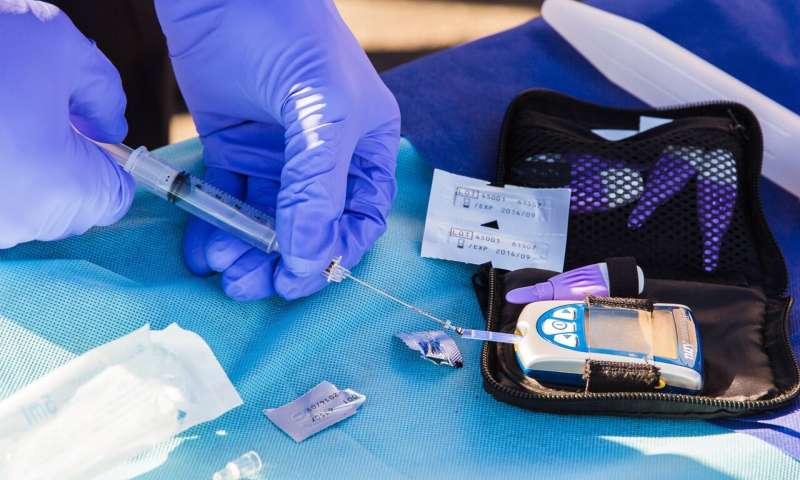Setting and achieving targets for treating diabetes patients with cholesterol or blood pressure medication, as well as tackling blood sugar levels, could save lives and reduce healthy-lifetime lost due to diabetes in developing countries, a new global study reveals.
Some 80% of people with diabetes live in Low- and Middle-income Countries (LMICs). Fewer than 6% of these individuals can access the care they need to manage their diabetes and prevent long-term complications like heart attacks, strokes, kidney diseases or blindness.
Researchers have found that if 80% of people had their diabetes and high blood pressure—which often accompanies the condition—diagnosed, treated, and controlled, and were given a cholesterol medication, healthy lifetime lost to patients from diabetes would improve by around by 6% over 10 years. This would be mainly from reduced cardiovascular conditions, like heart attacks or strokes.
The international research team, co-led by the University of Birmingham, published its findings today in The Lancet Global Health.
Co-lead author Professor Justine Davies, from the University of Birmingham’s Institute of Applied Health Research, commented: “We had already identified huge drop offs in the care received by people with diabetes in LMICs—from being diagnosed to being treated then having their condition managed, with fewer than 10% of patients getting the management they need.
“Setting global targets for HIV and AIDs has led to massive improvements in people getting the treatment that they need to save lives and improve health. Our research suggests that similar targets would certainly be useful in improving lives for people with diabetes. We must definitely now achieve scale-up blood pressure and statin medication treatment as part of our ongoing fight against diabetes.”
Benefits vary dependent on world region. For example, Central and Eastern Europe would derive most benefit from hitting targets, whereas countries in Oceania are already close to achieving these targets.
Hitting targets also would reduce deaths over the coming 10 years in all world regions, but the benefits are larger in some than others. For example, Eastern sub-Saharan Africa is the region with the most deaths from cardiovascular diseases due to diabetes at baseline (46 deaths per 1,000 people with diabetes) – if targets were achieved, deaths would fall to 27 per 1,000.
Analyzing health data from 23,678 people with diabetes in 67 countries, researchers estimate that achieving targets to improve the number of patients with diabetes who have their blood pressure properly treated and who are on a cholesterol medication, are among the most critical strategies for reducing diabetes complications in Low- and Middle Income Countries (LMICs). Boosting statin or blood pressure treatment by 10% would substantially cut the risk of cardiovascular events whilst boosting control of glucose had less benefit.
Researchers also discovered that when considering costs, achieving such targets in most world regions would come in below WHO thresholds for cost effectiveness.
The study reveals that taking such an holistic approach and treating diabetes and high blood pressure as well as giving a cholesterol medication is cost effective, but it is likely to be more complex to monitor whether counties are achieving these multiple targets. It requires countries to regularly collect nationally representative data in order to monitor how effectively diabetes care is reaching patients.
“The study has highlighted some of the most important gaps in current global diabetes data that are needed both to establish targets for diabetes care in LMICs and monitor progress toward achieving these,” added Dr. Jennifer Manne-Goehler, co-lead author from the Brigham and Women’s Hospital and Harvard Medical School.
“Until diabetes registries are established, it is vital to collect data that will help us to assess the prevalence of diabetes and other cardiovascular disease risk factors in populations. The greater impact of COVID in people with diabetes reinforces this urgency.”
University of Birmingham


